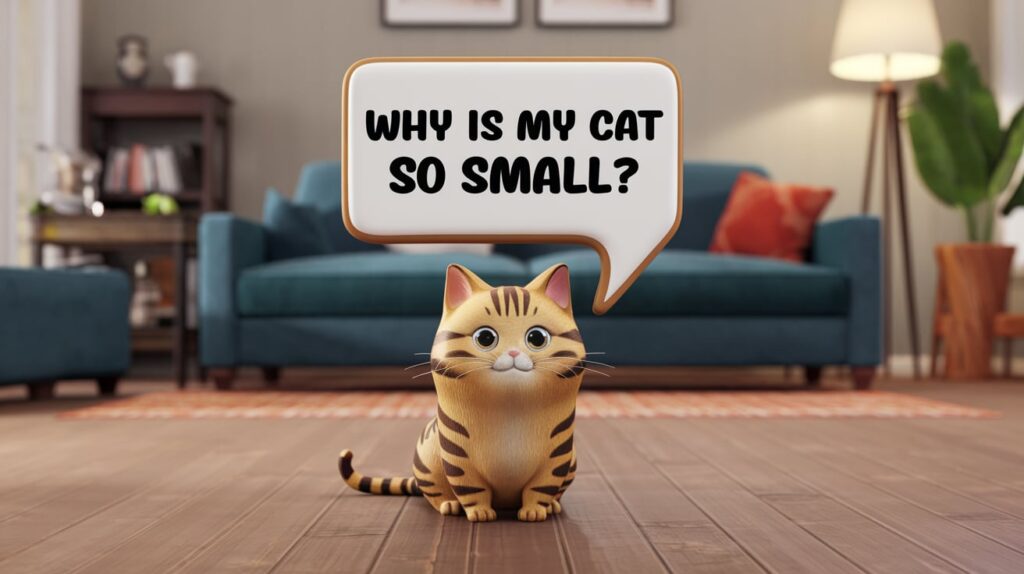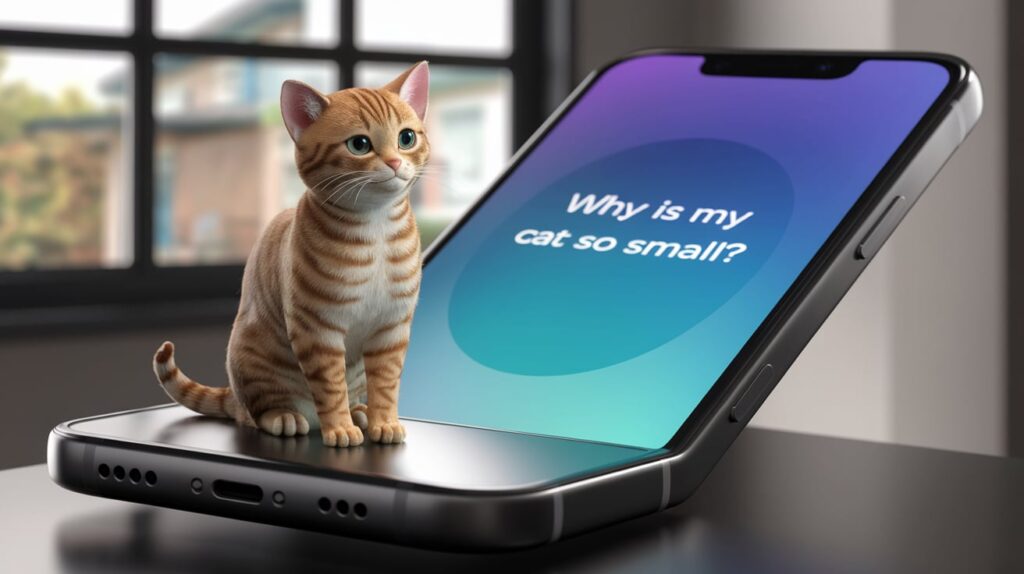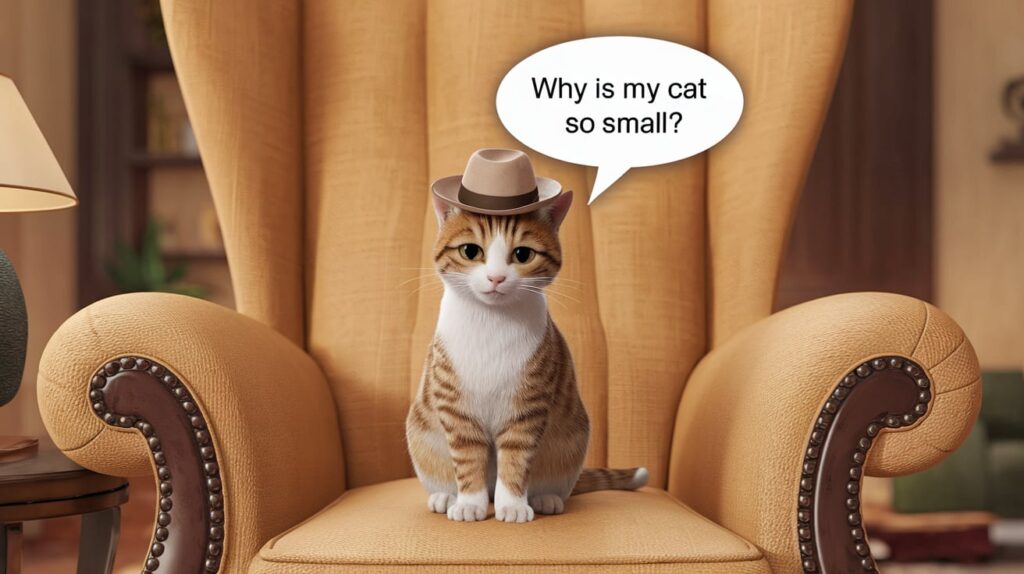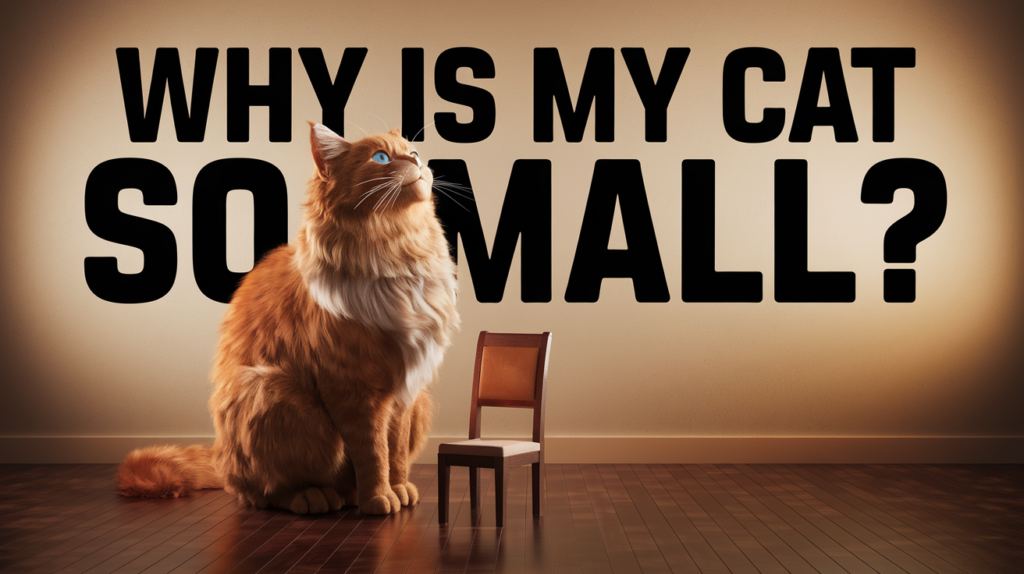Why Is My Cat So Small? Understanding the Factors Behind Your Cat’s Size
Cats come in all shapes and sizes, and while some cats are naturally small, others may seem smaller than average for various reasons. If you’ve ever wondered, “Why is my cat so small?” This article will help you understand the reasons why your cat might be small.
Genetics: The Primary Factor Behind a Cat’s Size
When asking, “Why is my cat so small?” the first thing to consider is genetics. Just like humans, cats inherit traits from their parents, and size is one of these traits. If your cat comes from a line of smaller cats, likely, they’ll also be small. Certain cat breeds are naturally smaller than others. For instance, the Singapura is one of the smallest cat breeds, with adults weighing between 4 to 8 pounds. On the other hand, breeds like the Maine Coon are known for their large size. The genetic lottery could result in a smaller-than-average cat if your cat is a mixed breed.
Age: Is Your Cat Fully Grown?

Another reason you might wonder, “Why is my cat so small?” could be related to your cat’s age. Cats reach their full size at different times, depending on their breed and overall health. Most cats reach their full adult size between 12 to 18 months, but some larger breeds might not fully mature until they are 2 to 3 years old. If your cat is still young, they may simply not have reached their full size yet.
Nutrition: The Role of Diet in Your Cat’s Growth
Nutrition plays a crucial role in a cat’s growth and development. A poor diet lacking essential nutrients can result in stunted growth, leading you to wonder, “Why is my cat so small?” Kittens need a diet rich in proteins, fats, vitamins, and minerals to grow well. If a cat doesn’t receive adequate nutrition during their developmental stages, they might end up smaller than they would have otherwise been.
Health Issues: Could There Be an Underlying Condition?
Sometimes, a small size in cats can be due to underlying health issues. If you’re wondering, “Why is my cat so small?” it’s essential to consider whether there could be a medical reason for their petite size. Conditions like parasites, malabsorption disorders, and chronic infections can prevent a cat from absorbing the nutrients they need, leading to stunted growth. Additionally, congenital conditions such as dwarfism can result in a cat being significantly smaller than average.
Parasites: A Common Culprit

Parasites are a common issue in cats, especially in kittens. Internal parasites like worms can rob your cat of essential nutrients, leading to poor growth. If your cat has had a history of parasites or you suspect they might have them, this could be the answer. Regular deworming and veterinary check-ups can help prevent and treat this issue.
Dwarfism: A Genetic Condition
Dwarfism in cats, also known as feline dwarfism, is a genetic condition that results in smaller-than-average cats. Cats with dwarfism often have shorter limbs, a broad chest, and a disproportionately large head. If you’ve noticed that your cat’s small size is accompanied by these physical characteristics, this could explain “Why is my cat so small?” While cats with dwarfism can lead healthy lives, they may be prone to certain health issues like joint problems or dental issues, so regular vet visits are important.
Malabsorption Disorders: When Nutrition Isn’t Enough
Sometimes, even with a proper diet, a cat may still be small due to malabsorption disorders. These conditions prevent the cat’s body from absorbing the nutrients in their food, leading to stunted growth and other health problems. If you’ve ruled out other factors and are still asking, “Why is my cat so small?” a vet visit to check for malabsorption issues might be necessary.
The Impact of Early Life Conditions
The conditions a cat experiences in their early life can also play a significant role in their size. Kittens that are born to malnourished mothers or are weaned too early might not develop as fully as they should, leading you to wonder. Additionally, kittens who experience significant stress or illness in their early months may have stunted growth as their bodies focus on survival rather than growth.
Spaying and Neutering: Does It Affect Size?

Many cat owners wonder if spaying or neutering their pets can impact their growth. While these procedures are crucial for controlling the cat population and can prevent certain health issues, they do not significantly affect a cat’s final size. “Why Is My Cat So Small?” However, cats that are spayed or neutered early might grow a bit larger because these procedures can slow down the closure of growth plates in their bones. If you’re wondering. It’s unlikely that spaying or neutering is the cause.
Environmental Factors: The Role of Stress
Stress can have a profound impact on a cat’s growth and overall health. A stressful environment, whether due to a lack of proper socialization, living conditions, or other factors, can stunt a cat’s growth. If your cat has experienced a lot of stress or has lived in less-than-ideal conditions, this might be why you’re asking.
Small Cat Breeds: When Small Size Is Normal
Some cats are naturally small due to their breed. If you’re asking, It could be because they belong to a breed known for its petite size. Breeds like the Singapura, Munchkin, and Cornish Rex are known for their small stature. These cats are perfectly healthy but just happen to be smaller than average.
What to Do If You’re Concerned About Your Cat’s Size
If you’re concerned and keep asking yourself, It’s important to take action. First, make sure your cat is on a high-quality, balanced diet suitable for their age and health status. Regular veterinary check-ups are essential to ensure that there are no underlying health issues affecting your cat’s growth.
Monitoring Growth in Kittens
If you have a kitten and are worried about their size, regular monitoring is crucial. Weigh your kitten weekly to track their growth and ensure they are gaining weight consistently. If you notice that your kitten isn’t growing as expected, or if you’re still asking, Consult your vet to rule out any health issues.
When to Visit the Vet
If your cat is significantly smaller than average, or if you notice other symptoms such as lethargy, poor appetite, or digestive issues, it’s important to consult a vet. These could be signs of an underlying health problem that might explain.

Conclusion: Embrace Your Cat’s Unique Size
In the end, every cat is unique, and size can vary widely even within the same litter. Whether your cat is small due to genetics, diet, health issues, or breed, what’s most important is that they are healthy and happy. If you’ve been asking, “Why is my cat so small?” this article should have given you some understanding of the different factors that might be involved. However, if you’re ever in doubt, it’s always best to consult with a veterinarian to ensure your cat’s small size isn’t indicative of a more serious issue.
FAQs: Why Is My Cat So Small?
- Why is my full-grown cat so small?
- Your cat might be small due to genetics, breed, or health factors. Some cats are naturally petite, especially if they come from a small breed or have experienced growth-related health issues.
- Do some cats always stay small?
- Yes, certain cat breeds, like the Singapura or Munchkin, are naturally small and will remain petite throughout their lives. Genetics also play a role in determining a cat’s adult size.
- Is it okay if my cat is small?
- Generally, it’s okay if your cat is small as long as they are healthy, active, and has a good appetite. If you’re concerned, it’s best to consult a vet to rule out any underlying health issues.
- What causes small cats?
- Small size in cats can be caused by genetics, breed, nutrition, early life conditions, or health issues like parasites or malabsorption disorders. Some cats are simply born small due to their genetic makeup.
RELATED ARTICLE:
Do Cats Like Sea Moss?

Welcome to Hypocats.com! I’m Khawar Akhtar, a passionate writer dedicated to all things feline. With a deep love for cats and a keen interest in their health, diet, and training, I strive to provide cat owners with valuable insights and practical advice to enhance their furry friends’ well-being. My goal is to share my expertise and enthusiasm for our whiskered companions, helping them lead happier, healthier lives. When I’m not writing, you’ll find me spending quality time with my Russian Blue cat, enjoying the simple joys that come with being a cat lover. Thank you for visiting Hypocats.com—I hope you find the information here as helpful and inspiring as I do!


Leave a Reply